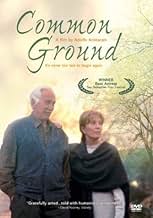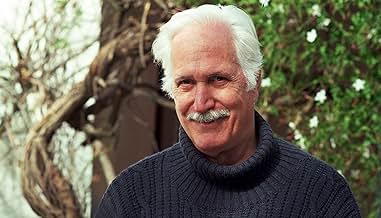CALIFICACIÓN DE IMDb
7.6/10
2.1 k
TU CALIFICACIÓN
Un profesor de pedagogía de 60 años es obligado a retirarse debido a sus altos ideales y se va a vivir al campo junto con su esposa.Un profesor de pedagogía de 60 años es obligado a retirarse debido a sus altos ideales y se va a vivir al campo junto con su esposa.Un profesor de pedagogía de 60 años es obligado a retirarse debido a sus altos ideales y se va a vivir al campo junto con su esposa.
- Dirección
- Guionistas
- Elenco
- Premios
- 13 premios ganados y 13 nominaciones en total
- Dirección
- Guionistas
- Todo el elenco y el equipo
- Producción, taquilla y más en IMDbPro
Opiniones destacadas
LUGARES COMUNES (Common Ground) is yet another sensitive Argentinean film that has the courage to deal with the bumpy political life of Argentina as well as the equally rocky road to aging. Based on the novel by Lorenzo F. Aristarain and directed by Adolfo Aristarain this is a film of sunlight and shadows - and those clouds that promise to unveil the sun despite passing darkness.
Fernando Robles (Federico Luppi) is a writer and university professor in Buenos Aires who is informed before his planned trip to Madrid to visit his son Pedro (Carlos Santamaría) and daughter-in-law Natacha (Valentina Bassi) that he is being placed in early retirement: the crumbling government of Argentina cannot support such things as education! After an exquisite farewell of sage advice to his students on what is important in the role of a teacher, he goes home to his loving wife of many years Liliana (Mercedes Sampietro) to prepare for their journey to Madrid. At the airport Liliana senses sadness in Fernando and he confesses that he has been 'fired', that they have little money to live on in Buenos Aires: he covers his sadness by buying Liliana perfumes she loves. This couple is bonded so beautifully it makes us weep.
In Madrid the couple is forced to stay with the son and daughter but the closeness of this familial proximity is intolerable when Fernando informs his son of his financial situation. Pedro is cold and harsh and is in life for money and refuses to assist his parents. The couple leaves, returning to Argentina where they under advice from lawyer Carlos (Arturo Puig) sell their home and move to the country where they plan to grow grapes - a return to the purity of the land. But fate intervenes and the story ends in a manner that leaves the viewer sad but wiser.
The cast is sterling and the direction is first rate. This is one of those films that should be required viewing for many reasons, but especially for people who are approaching the time of retirement and the fear that holds. Highly recommended for a large viewing audience. In Spanish with English subtitles. Grady Harp
Fernando Robles (Federico Luppi) is a writer and university professor in Buenos Aires who is informed before his planned trip to Madrid to visit his son Pedro (Carlos Santamaría) and daughter-in-law Natacha (Valentina Bassi) that he is being placed in early retirement: the crumbling government of Argentina cannot support such things as education! After an exquisite farewell of sage advice to his students on what is important in the role of a teacher, he goes home to his loving wife of many years Liliana (Mercedes Sampietro) to prepare for their journey to Madrid. At the airport Liliana senses sadness in Fernando and he confesses that he has been 'fired', that they have little money to live on in Buenos Aires: he covers his sadness by buying Liliana perfumes she loves. This couple is bonded so beautifully it makes us weep.
In Madrid the couple is forced to stay with the son and daughter but the closeness of this familial proximity is intolerable when Fernando informs his son of his financial situation. Pedro is cold and harsh and is in life for money and refuses to assist his parents. The couple leaves, returning to Argentina where they under advice from lawyer Carlos (Arturo Puig) sell their home and move to the country where they plan to grow grapes - a return to the purity of the land. But fate intervenes and the story ends in a manner that leaves the viewer sad but wiser.
The cast is sterling and the direction is first rate. This is one of those films that should be required viewing for many reasons, but especially for people who are approaching the time of retirement and the fear that holds. Highly recommended for a large viewing audience. In Spanish with English subtitles. Grady Harp
In Buenos Aires, a few days before traveling to Spain with his beloved wife Liliana Rovira (Mercedes Sampietro) to visit their son Pedro (Carlos Santamaria), the leftist Literature Professor Fernando Robles (Federico Luppi) is compulsory retired in the University, and he concludes that it is impossible to live with his pension. The crisis in Argentina does not allow Fernando to get a new job, and his wife decides to sell her family's apartment and move to a small farm in Cordoba to reduce their expenses. Once in the country, while adapting to the new lifestyle, a tragedy happens.
"Lugares Comunes" is a very beautiful, critical, human, sensitive and real film about love, life, adaptation and convictions in the third age. The story takes place in Argentina, but could be in Brazil or any South American country, where in general people can not keep their status with their retirement pension, being forced to continue working to survive, or to fall from middle-class to very poor class. This touching narrative has a perfect pace and flows naturally, supported by the impressive performances of Federico Luppi and Mercedes Sampietro. All the characters are credible and beautiful (with the exception of the head of the university), and this movie is a gem. My vote is eight.
Title (Brazil): "Lugares Comuns"("Common Places")
"Lugares Comunes" is a very beautiful, critical, human, sensitive and real film about love, life, adaptation and convictions in the third age. The story takes place in Argentina, but could be in Brazil or any South American country, where in general people can not keep their status with their retirement pension, being forced to continue working to survive, or to fall from middle-class to very poor class. This touching narrative has a perfect pace and flows naturally, supported by the impressive performances of Federico Luppi and Mercedes Sampietro. All the characters are credible and beautiful (with the exception of the head of the university), and this movie is a gem. My vote is eight.
Title (Brazil): "Lugares Comuns"("Common Places")
Aristarain is one the greatest film-maker in Argentina; if he were born in an other country (more economically powerful) he would probably be a sort of classic film-maker in the history of cinema. Aristarain belongs to an old generation of argentinian artists who has been wise enough in order to keep on with his believes and aesthetics but without being stuck in the past. His movies are fresh and sharp. He doesn't lose his grip which makes his narratives very well deployed as well as subordinated to a couple of constant topics: the lost of national identity, or the dialectical swing between subjectivity and social life which is doubled in another kind of paradoxical choice between remain faithful towards oneself or to give up and obey the conservative imperative of petty-bourgeois which demand to fit in the status quo. Lugares comunes looks like a minimalist film, but it is a essential one because whatever is unnecessary in this story is not included. Luppi, by the way the best actor from Las pampas, is a literature teacher, a prototype of middle class member who is retired in advance. He is a leftist man who have found that the dream of another society started in 1879, and after that date that longing for another kind of society has been systematically betrayed. Sampietro, his wife, is an spanish woman who work with the poor. After being left with a miserable pension they have to reconsider where they want to (and can) live. They finally end running a farm. The film has many virtues: for instance, one is able to see how social history determine and comprise the psyche life of individuals. Moreover, Lugares comunes is a document of Argentinian decadence, a very satisfactory tale of how people manage to keep its decency. But it is also a love story and a philosophical meditation about getting older, the limits of reason, and how to live when there is not any transcendental meaning except the fact of being alive. The name of the film is an ironic antithesis because Lugares comunes is at odds with common sense: it is a honest critic of each ideological gadgets which has made of Argentina a ghost and creepy territory where people want to fade or voluntary exile if they still strive for being alive with any gesture of human integrity.
I've always thought that Adolfo Aristaráin is not only a cinema director, he's a philosopher,a thinker, a so lucid mind, and overall an idealist. Cinema is not just something to entertain people but a powerful tool to express himself.
"Lugares Comunes" (Common places) tells the story of an Argentinian middle-aged couple (played wonderfully by the great Federico Luppi and Mercedes Sampietro which decide to move to the country from Buenos Aires. He's just been fired from the school in which he's been teaching' for most than 30 years (because of his left-winged ideas). So, he a his wife cannot afford to live in B. Aires anymore. That's the base for a long, overwhelming reflection about life, honesty, unconditional love, commitment, and all those things that seem to be a little "old-fashioned" nowadays (but they are not).
This is a movie to think about, you must focus on it, you have to assimilate what you're hearing... Otherwise, you'll be wasting your time. This ain't nonsense and hollow entertainment, this is something else. Let Aristaráin open your eyes... you won't regret.
*My rate: 8.5/10
"Lugares Comunes" (Common places) tells the story of an Argentinian middle-aged couple (played wonderfully by the great Federico Luppi and Mercedes Sampietro which decide to move to the country from Buenos Aires. He's just been fired from the school in which he's been teaching' for most than 30 years (because of his left-winged ideas). So, he a his wife cannot afford to live in B. Aires anymore. That's the base for a long, overwhelming reflection about life, honesty, unconditional love, commitment, and all those things that seem to be a little "old-fashioned" nowadays (but they are not).
This is a movie to think about, you must focus on it, you have to assimilate what you're hearing... Otherwise, you'll be wasting your time. This ain't nonsense and hollow entertainment, this is something else. Let Aristaráin open your eyes... you won't regret.
*My rate: 8.5/10
Fernando (Federico Luppi), a Professor of Literature in his sixties in Buenos Aires and his wife Lili (Mercedes Sampietro), a social worker are respected in the community and loving partners. Their world is turned upside down however when Fernando receives notice that he is being asked to retire early. The enforced retirement, a result of the economic crisis in Argentina, comes as a complete shock and he and his wife are forced to make drastic decisions that threaten the foundations of their comfortable life. Based on the novel "The Renaissance" by Lorenzo F. Aristariain, Common Ground, the new film by Argentine director Adolfo Aristarain (A Place in the World, Martin), is a story about love, getting older, and discovering what is important in life. It is also an acid social comment on the current state of life in Argentina where thousands of Argentinans have had to face a similar end to their secure middle class existence.
Fernando and Lili have a son Pedro (Pablo Rago) who lives comfortably in Spain with his wife and two children. A leftist man of strong convictions, Fernando tells his son about his meager pension left to him by the university but refuses his assistance. Instead he berates him for abandoning his country and selling out to make money. When the couple returns to Argentina, they are forced to sell their apartment in the city, purchase a farm and bravely set out on a new style of living. Their adjustment to rural life has its moments of sadness but their striving to live out their lives with dignity and purpose is profoundly human. Though Common Ground does not reach the heights of Aristarain's A Place in the World, it is an honest film and one that celebrates the strength of a loving family.
Fernando and Lili have a son Pedro (Pablo Rago) who lives comfortably in Spain with his wife and two children. A leftist man of strong convictions, Fernando tells his son about his meager pension left to him by the university but refuses his assistance. Instead he berates him for abandoning his country and selling out to make money. When the couple returns to Argentina, they are forced to sell their apartment in the city, purchase a farm and bravely set out on a new style of living. Their adjustment to rural life has its moments of sadness but their striving to live out their lives with dignity and purpose is profoundly human. Though Common Ground does not reach the heights of Aristarain's A Place in the World, it is an honest film and one that celebrates the strength of a loving family.
¿Sabías que…?
- Citas
Fernando Robles: Don't value your students based on their answers. Answers are not true, they seek a truth that will be only relative.
Selecciones populares
Inicia sesión para calificar y agrega a la lista de videos para obtener recomendaciones personalizadas
Detalles
Taquilla
- Total a nivel mundial
- USD 2,108,596
- Tiempo de ejecución1 hora 48 minutos
- Color
- Mezcla de sonido
Contribuir a esta página
Sugiere una edición o agrega el contenido que falta
























